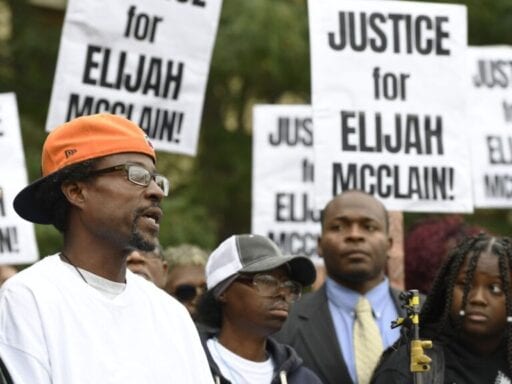Nearly a year after McClain’s death, Colorado’s governor has reopened the case.
The circumstances of Elijah McClain’s death are as horrifying as any of the killings now infamous in the age of Black Lives Matter. Last year, McClain lost his life less than a week after encountering police on a walk home in Aurora, Colorado. McClain, who was anemic, regularly wore a ski mask because he quickly grew cold. Last August, a resident spotted him wearing his mask while returning home from the store, called the police, and reported him as “sketchy.”
According to video from body camera footage and news reports, when officers arrived, they immediately marched up to McClain and accosted him. McClain grew tense as officers grabbed and restrained him. During the altercation, officers placed McClain in a chokehold, threatened to have him bitten by their police dog, and deliberately obstructed the view of their body cameras, all while McClain pleaded for help, begged for forgiveness, and explained he meant no one any harm.
McClain threw up several times during the arrest and was handcuffed behind his back. When the paramedics arrived, they injected him with 500 milligrams of the sedative ketamine. McClain slipped into cardiac arrest on the way to the hospital. Three days later, he was declared brain-dead and taken off life support.
Despite his tragic death and having committed no crime, the initial investigation found no criminal wrongdoing by officers. However, in the weeks following this year’s national uprising against police brutality, new attention was brought to McClain’s story, breathing life back into the case.
On June 25, Colorado Governor Jared Polis ordered prosecutors to reopen the investigation into McClain’s death.
“Elijah McClain should be alive today, and we owe it to his family to take this step and elevate the pursuit of justice in his name to a statewide concern,” Polis said in a statement posted to Twitter.
Floyd’s case brings new attention to old police killings
McClain is one of the many people killed by the police whose case has gained new attention following the protests against George Floyd’s killing. In recent weeks, Google searches for McClain’s name have spiked after remaining relatively unknown nationally in the year since he was killed. So far, more than 3 million people have signed an online petition calling for justice for McClain.
The new attention is thanks in part to the activism of friends and family and in part to the new groundswell of social media campaigns advocating with comics, pictures, and artist renderings of McClain and other Black people killed by the police.
Much of the content of these social media campaigns contrast the care and restraint that police have displayed in arresting white citizens such as Dylann Roof, who shot nine Black parishioners in South Carolina, against the force used on Black citizens like Walter Scott, who was shot in the back after fleeing a traffic stop. The comparison posts cut sharply for McClain, who was killed in Aurora, Colorado, the same city where police successfully apprehended a white man who shot and killed 12 people at a movie theater.
The political coattails of the George Floyd protests have elevated others killed by the police, including Breonna Taylor in Louisville and Javier Ambler in Austin. These names humanize the statistics for police killings, which have hovered around 1,000 people annually since 2015. Likewise, the protests have also brought renewed scrutiny to police impropriety in the murders.
As witnessed in George Floyd’s case, Rayshard Brooks’s case, and more broadly in the televised brutality toward peaceful protesters, officers regularly have omitted crucial details in documents and statements after employing excessive force toward civilians. Just this week, after stonewalling, the Philadelphia Police Department apologized for excessive use of force against protesters after a New York Times investigation exposed the department for using tear gas against trapped protesters.
Individual bungled police cases combined with the large-scale controversies following protests have resulted in more calls for accountability and transparency around police use of force for cases old and new.
Support Vox’s explanatory journalism
Every day at Vox, we aim to answer your most important questions and provide you, and our audience around the world, with information that has the power to save lives. Our mission has never been more vital than it is in this moment: to empower you through understanding. Vox’s work is reaching more people than ever, but our distinctive brand of explanatory journalism takes resources — particularly during a pandemic and an economic downturn. Your financial contribution will not constitute a donation, but it will enable our staff to continue to offer free articles, videos, and podcasts at the quality and volume that this moment requires. Please consider making a contribution to Vox today.
Author: Aaron Ross Coleman
Read More



